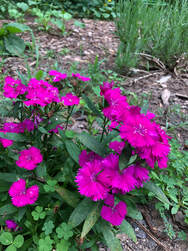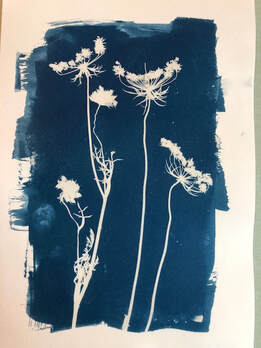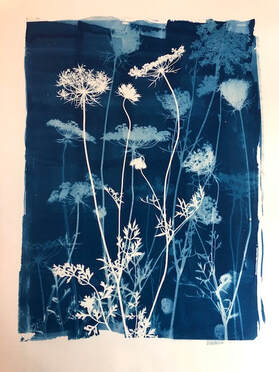|
Lewis's Miniature Garden brings joy bubbling up from the experience of the garden and the message it brings. It's a message of delight and wonder--a glimpse into the original design and the future restoration. For Lewis the moment was tied to that small garden. For me it was a walk through a high mountain meadow. Here was everything I ever wanted. Here was fulfillment. Here was the call of the Creator to come in, come in! " Draw near to God and He will draw near to you."
0 Comments
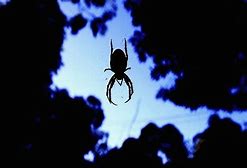 A warm winter day, and I sit on the porch admiring the sky. The smallest of spiders dangles down from the rafters, and the breeze lifts him up and swings him back. Spider season is coming. This is when every walk through the woods involves the first-in-line waving a stick or such to clear the way from the sticky fibers that transverse every pathway. This is when power lines are decorated in glittering webs in consistent distribution between the wires along the roadway. I've always been impressed with the skill and tenacity of the spiders. And confused. I could not figure out how they anchored their webs on both sides, considering they are so small. So small. I was thinking they had plans and were in control of their web building. I couldn't be more wrong. As the tiny spider dangles before me, I watch the wind swing him upwards and can see the multiple possibilities of where his second anchor might eventually be. It occurs to me it doesn't matter to him; his calling is to build a web. And rebuild it when it is destroyed. But he anchors one end, and then lets the wind take him where it will, always ready to anchor the second end and begin work. How many times does the spider attempt the second anchor, so he can begin building? How long does it take? Some spiders must hit the jackpot right away, while others must wait and wait and wait, for what could seem like an eternity. They could get very hungry. I'm thinking each spider must have it's own story, so to speak. But most impressive is their ability to anchor on one side and swing in the breeze for the rest. This is trust. This is faith. 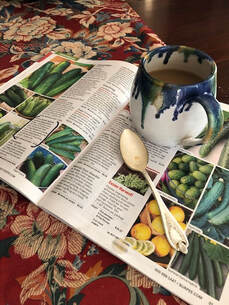 Dreams of a proper frozen winter with a garden inaccessibly buried in snow have come to a crashing end. We are beginning to talk over morning coffee about things that must be done there--things I've seen but have been ignoring. The Husband wanted to set a gardening date for this week, but that seemed "unholy" to me; we must at least wait until February. He was easily persuaded. But February starts next week. I know once I get out there I will find it invigorating. I will love the results of a few hours work to produce a greater aesthetic. But for me, I realize, it is not so much the process in the garden that I enjoy. It is the product. In an art class years ago, during the final critiquing session, the teacher asked each student whether they joyed over the process or the product. Process, process, process, I thought, and even to this day I love the smearing of paint or the combining of yarns for a desired effect, and seem to have endless patience for the road rather than concern for the destination. In the garden, however, I don't relish the process, but am motivated by the product--an aesthetically pleasing place where the birds, bees and butterflies want to hang out, and the whole (as opposed to the parts, individually considered) shouts success and beauty. This may be why I take garden failure more personally. I want to put something someplace, have it happily show off its assets, and have it stay there. Stay there, you! Just. Stay! But, alas, the garden is always changing. Even year to year I cannot count on its behavior. Not unlike my own personal or spiritual growth, where I think I have something down. "Hey," I think. "I've got this goin' on!" and it pops up again, sometimes in a different place, sometimes in a different form, but one way or another I have to face it again. So my challenge is to view the garden in process and stop trying to bop-the-bunny to get a moment of perfection, commensurate with my dreams and visions, that will nonetheless just never stay put. I don't know why I don't look at it the same way I look at smearing paint or twining yarn, but I am ever hopeful that I can learn to take lessons from the studio into the garden, accept what is, embrace the process, and keep working, working, working... Honestly, I wonder if our Creator has the same sense of frustration with us, His stubborn little gardens. It's the warmest January here yet, and the temperature is calling weeds up from what should be a frosty ground, and trees and bulbs are being fooled into budding forth with confidence. On one hand I'm not happy, because the season of rest for the garden and the gardener has been interrupted. On the other hand, it is magical in its exceptional oddness. The mist visible through the trees quiets and tempers the landscape and the smell of moist ground is one of those things I love most about North Carolina. Passing by an open pasture in the afternoon I thought, "A cloud has touched the ground." In the bursting green of the newly minted weed beds of my garden, I see -- well, yes--a lot of work to be done. But I can also see the image of the insistence of life. I choose to watch in awe as my expectations are befuddled. Once again I learn to hold my plans loosely, be light on my feet, and laugh with God. * Awe is an intuition for the dignity of all things, a realization that things not only are what they are but also stand, however remotely, for something supreme. Awe is a sense for transcendence, for the reference everywhere to mystery beyond all things. It enables us to perceive in the world intimations of the divine. ... to sense the ultimate in the common and the simple: to feel in the rush of the passing the stillness of the eternal. What we cannot comprehend by analysis, we become aware of in awe. -Abraham Joshua Heschel From the Yiddish proverb, Man plans and God laughs.
A Lesson in Seasons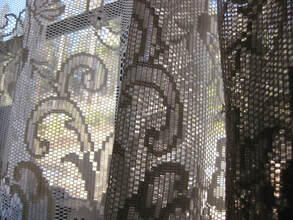 We've had a couple of very unseasonably and unreasonably warm days this past week. It is deep winter, so thoughts of the garden did not cross my mind until a friend mentioned how she had been working outside during the cold and thereby freezing her fingers in the post-frozen soils of her garden beds, when, had she but waited, she could have done all that in these unusual balmy days of December. Oh. I thought. I should have been working in the garden. Missed my chance! But, unlike my friend, I don't plan to care for the garden during the months of cold. I consider this time to be "months off," when both the garden and I rest and prepare to take the deep breath needed before charging in to the early spring tasks of cleaning and preparing the beds and setting up grow lights in the mud room. I look out the windows toward the gardens and feel no draw--no desire to get out and get dirty. I do an occasional walkabout, and merely shrug at the weeds and twigs and all manner of thing that could be accomplished. I'm on short day mode, semi-hibernating, and happy here. But I know all that will change when the time is right...when the lengthening days flip a switch in my soul and call me out. The process echoes the wisdom of the book of Ecclesiastes (or, if you prefer, the song by the Byrds.) There is a time for everything, and a season for every activity under heaven. The hard part is recognizing the seasons, and how sometimes I push on an issue out of time. Like my friend who reaped frozen fingers in her garden, I seek an unsanctioned vision, and find myself at best spinning my wheels, or at worst, shutting off whatever grace there would have been in that direction. That's my gentle way of saying I damage my own walk. It's so hard to rest...to rest...to rest. To rest involves trust, an inhuman level of trust that we are indeed called to, but cannot accomplish in our own strength and inclination. There is such joy there, such peace. The place where our wheels no longer spin, both outwardly in our material efforts, or inwardly, in our pattern of self-condemnation. My hope for you, as for all of us, is that this new year find you resting in the pure life of your Creator and delighting in the wisdom of the seasons. 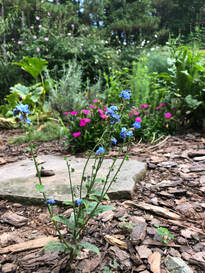 In the east, traditionally, the garden was on the outskirts of town, fully enclosed and often guarded, having a watchtower for the watchman to keep away beasts and robbers. Here in the west, a garden is an area close to the house, used for growing herbs, flowers, vegetables and other green things. It may or may not be enclosed. Unless, of course, as in the east of the west like here in North Carolina, you need to keep out the beasts both big and small that come out of the forest and nibble on all manner of tasty thing. 'Haven't had issues with robbers yet. (And at the rate of production of my garden, I really don't expect to. ;-)) One reader of this blog has said, "It all started in a garden." And indeed it did. That garden is real as well as metaphorical--the place of our dreams where we are no longer separated from our Source, and are fully realized. The place we long for, whether we recognize it as such or not. Two men observed the young son of one who was dancing joyously to music only he could hear. The father of the boy turned to the other man and said, shrugging, "He is still in the garden." Though no human truly remains in that Garden, the boy had a piece of it in his heart--enough of a piece, enough of a glimpse, that he touched the joy of true reality and danced with it. I believe that this is available to us, no matter how long we have dwelt on this earth, nor no matter how many beasts and robbers have ravaged our garden. In relationship with the Creator, the garden is restored, and yet it is up to us to collaborate in that, for we are told to guard, or keep, our hearts. Yet we are not the watchman. The Creator is the Watchman, the Perfect Watchman, if we dedicate the garden to Him. For a fitting exposition of the call to guard our hearts from Proverbs 4:23, click here.
A Disturbance in the Forest Part Deux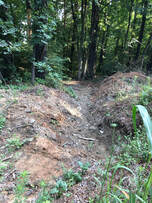 I have been keeping an eye on the disturbed area in our neighborhood forest. I thought the scar would be long-lasting and perpetually ugly during that time. As I've watched, the native plants have come in--first those pioneers that delight in disturbed ground, and then -- well, I'm still waiting for the "and then." But I have no doubt that the healing is on the way. 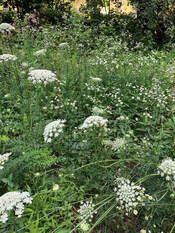 Oh! To have faith that in time every scar is healed. That all damage will come out repaired and improved on the other side. And yet, that is what we need to believe; that the fruit of our afflictions is worth the agony of going through those afflictions. That creation groaning in travail yet looks forward to the chains to fall away and to the resurrection of wholeness which will transform it to its very core. 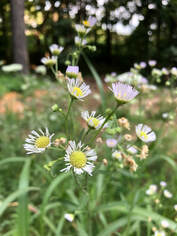 For our light affliction, which is for the moment, worketh for us more and more exceedingly an eternal weight of glory. 2Cor. 4:17 ASV I see in this disturbed plot of ground an immediate healing process--the pioneer plants that hold the earth until healing is complete and wonder if it is the same for us--when trials come, is there a temporary covering that protects us enough until the deep work can be done? I want to look for it. In the meantime, the pioneer plants themselves provide an opportunity to create beauty--beauty from the results of the disturbance in the forest...
"God says what He says because it is good for life." Professor Darrell Bock, in an interview with Dr. Michael Brown. The garden won't grow without sunlight (Do you have 6 hours of sun for your planned garden location?) The garden won't grow without water (Do you have an irrigation system--or easy access to water?) The garden won't grow without good soil (Have you broken up the fallow ground?) The garden won't grow without seeds...seeds don't happen without pollination...pollination doesn't happen without pollinators....pollinators sometimes sting.... We spent many years struggling to keep a garden going in a dry and parched land, without an irrigation system. When we finally put in a drip system, lo and behold, green happened! We would joke about it and say, "Funny thing that! It turns out plants need water." I still buck against the garden books that insist I need a plot with 6 hours of sunlight ("Come on, already! Really?) I want to plop seeds in the ground wherever I want and then expect a profusion of beautiful or edible plants. Quickly. But no matter how I fight against it, I can't escape the Law of the Garden. See above. Things just work out better when I operate within those given parameters. There are many things we fight against when our Creator tells them to us. The first, is that our relationship with Him is broken--oh, so broken. We invent all kinds of things/gods to replace Him and point to our makings and say, "See! Me and God, we're good!" It is hard enough to know Him as He truly is (if we ever will, but this is our task and our calling) without saying back to Him, "No! I don't like that! You can't be like that."
"Sorry," He might say. "I am." 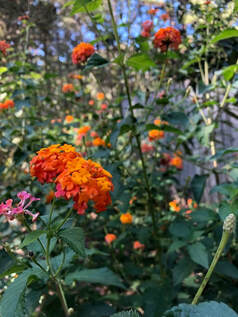 The first winter of this garden, we pulled out a plant we thought was dead. All indicators showed it was...the leaves were gone, yes, but moreover, the branches had a dead snap to them, and there was no green to show when the branches were scratched. What we did not know, was that here, in our new home, life goes underground (for the perennials), and waits for the winter to pass, saving its branches from the freeze that might creep down into all parts of the plant. Now I watch as perennials retreat into themselves, and I don't freak out. Sometimes in late summer I peak below the surface and see new green waiting beneath the withering leaves and stems, and I smile at the promise of new life beyond the winter cold. But my thoughts the other morning were of how we also fall apart toward the end of our season. We fall apart, and things that once seemed so important fall away from us when we near the time to be separated spirit from body. It's a God-given process to prepare us to be glad to shed this husk. It put me in remembrance of the process we go through when our children prepare to break away from us as they grow. There is change, and pain, and things die and new things come about. It is sad but it is inevitable. And there is something new and important on the other side. Hopefully in this instance, something glorious. What is the relationship between pain we would rather avoid, and its role in preparing us for an upcoming separation? If we could understand what is coming--what is always coming, for separations are inevitable--we might better bear up under what is. 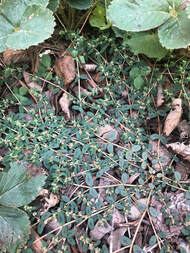 Doing what I call "walkabout" one morning in the garden, I saw the freshly weeded beds beginning to sprout again with sons and daughters of the weeds I had just removed. I had not had time to plant and mulch in the direction I wanted the bed to go. This process reminds me so much of what my Rabbi says about cleaning up and cleaning out, and how if you don't fill the space with the "right stuff," it refills with the "wrong stuff" even more so--Matthew 12:43. OK. So weeds don't actually pass through waterless places and find no place to rest and the analogy falters, but there is something to the need to crowd out the weeds to reduce their number--in our gardens and in our hearts. But that is not what this post is about. When I lifted my eyes I could see the garden as a whole, including its environs, glowing with the light of a soon-coming-Autumn sun, and I saw the hope of relief and refreshing and renewal for the coming year--the new year from the point in time of the blowing of the shofar. I reached to pluck out a weed and felt the oddness of appreciating it for the satisfaction it gave me in its removal. I love these weeds, I thought. They flatten themselves along the ground and spread from one source root, and yield to my tug in a most satisfying way. A new way of seeing for me. And I want to see in a new way: "Jesus saw the Kingdom in a mustard-seed, and the adoring woman in a harlot. He saw the solid rock in Simon, and the lover in the son of thunder. He saw in a child the citizen of heaven, in a bit of bread His broken body, in a cup of common wine His sacred blood...Never was a vision such as this, because never was there a nature such as this." (George H. Morrison) It makes me wonder what He sees in me. What He sees in us. Moreover, it makes me wonder: What of the Kingdom could I see if I asked Him to show me, if I allowed Him to give me a new way of seeing... |
